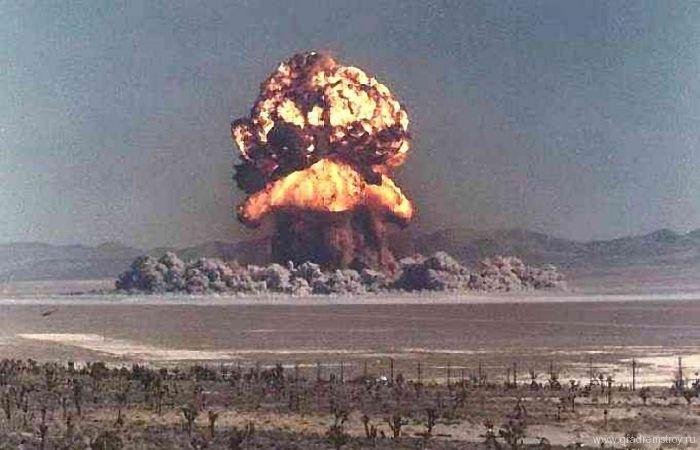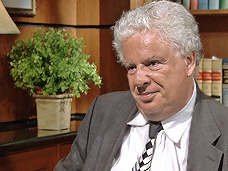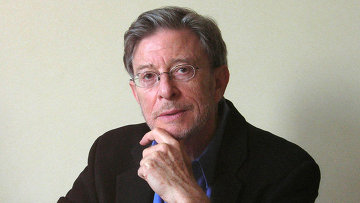
 Institutions shape people, but then again people change and, at times,
subvert the institutions in which they sit. There is no better illustration of
this ancient piece of folk wisdom than the just published booklet entitled Costs of a New Cold War: The US-Russia
Confrontation over Ukraine from the Center for the National Interest
(NI),which is now on the hot reading list of Washington insiders, if its
promotion by Johnson’s Russia List may be taken as an indicator.
Institutions shape people, but then again people change and, at times,
subvert the institutions in which they sit. There is no better illustration of
this ancient piece of folk wisdom than the just published booklet entitled Costs of a New Cold War: The US-Russia
Confrontation over Ukraine from the Center for the National Interest
(NI),which is now on the hot reading list of Washington insiders, if its
promotion by Johnson’s Russia List may be taken as an indicator.In the brief mission statement which NI places on all its publications, management reminds us that the institution began its life as the curator of the political legacy of President Richard Nixon. Indeed for years it operated under the name of The Nixon Center. And though its present interests are global hot spots, the Center’s core mission was reflected in its founder, Russian émigré Dmitri Simes, who had served as Richard Nixon’s go-to man on his post-presidential trips to Russia and became his designated president of the Center.
For these reasons the booklet Costs of a New Cold Warshows just how far the legacy of Realpolitik has been clipped and marginalized by the resurgent forces of Neoconservatism in Washington and in the think tanks spread across the country. Although this collection has authors expressing various points of view, and is structured to present 2 Russian and 2 American perspectives on the East-West confrontation, I would draw attention to the introduction by editor Paul J. Saunders, and more especially to the essay by Thomas Graham, a director of Kissinger Associates and probably the most powerful and influential of the contributors.
Graham’s "Dangers of a New Containment Policy for Russia” sets out almost without comment the official American policy directed at degrading if not destroying Russia’s economy with further ratcheted up sanctions from which the only way back appears to be regime change. Graham makes it plain that Washington is determined to break every bone in the Russian body politic. Both his essay and that of Paul Saunders are imbued with American triumphalism and assume as a given American global hegemony. Such hegemony, of course, is the very antithesis of Realpolitik policies such as Richard Nixon pursued, where balance of power is the assumed script.
Thus, Kissinger Associates is now run by the supporter of a political philosophy totally at variance with the much more nuanced and genuinely Realpolitik views of its founder. Thus the National Interest is putting into circulation Neoconservative views that run totally counter to what its nominal publisher and president Dmitri Simes says on Russian state television.
The assumption that the US can and will do far more damage to Russia and that Russia, in the short term, can do little or nothing to retaliate is supported by the feeble essays representing the Russian side. Fedor Lukyanov is an IR theorist who directs his attention to medium or long term Russian efforts to change global governance, though the confrontation will likely be resolved in the short term. Igor Yurgens’ main concern is how the sanctions damage the position of his fellow Liberals and give control over the Russian economy and polity to their opponents in the Kremlin camp. Any strike back by the Kremlin is outside his field of interest.
The authors of the book all believe that Washington is calling the shots and it is Russia's lot to suffer, largely in silence and ineffectually because it is by far the weaker party in the fight. But then they are assuming total rationality, they are not thinking about the unthinkable. I invite our panel to do just that.
In that regard, let us remember that none other than the great Realist Richard Nixon demonstrated in his Christmas bombing of North Viet Nam that seemingly irrational behavior can be used by great powers when they are pressed.
The questions for discussion are how do we imagine Russia can strike back at short term existential threats which the American scenario by Graham sets out? Will they turn off the valves on gas deliveries to Germany, for example? And at what point can destructive economic warfare by the USA and the EU trigger a military response from Russia, such as a strike that ends in the capture of Kiev and overthrow of its government?
 The topic for
the Discussion Panel is provided by Gilbert Doctorow,
The topic for
the Discussion Panel is provided by Gilbert Doctorow,
Gilbert Doctorow is a Research Fellow of the American University in Moscow
Expert Panel Contributions
 Blindness and
Insouciance
Blindness and
Insouciance
By Martin Sieff
Martin Sieff is a national columnist for the Post-Examiner online newspapers and a senior fellow of the American University in Moscow
Over the past quarter century Thomas Graham has earned a deserved reputation as one of the most experienced and skillful American diplomats dealing with Russia. This makes the program he outlined for "containing” Russia in The National Interest so extraordinary and even alarming.
The first flaw to be pointed out in Graham’s program is that it assumes total passivity and passive acceptance on the part of Russia’s leaders and its people in the face of the program he outlines. There is nothing "realpolitik” or "realist” about this assumption. On the contrary, if we are to accept any validity to Hans Morgenthau’s political science model of "realism,” we must acknowledge that great powers will always follow what they perceive to be their best interests. However, the unavoidable conclusion to be drawn from the Graham program is that any attempt at accommodation or passive acceptance by Russia of that program would be a waste of time. For if the Graham program were to be implemented by the Obama administration or any future one, Russia would be left with no option except to oppose the US program with reciprocal or greater force in the very real interest of its own survival.
The second flaw is that Graham’s program is neat and tidy. It does not go into dirty details of what its implementation might lead Russia to do. Henry Kissinger, the founder of Kissinger Associates, in his great history Diplomacy never fails to point out how reckless, aggressive policies by any major power generate their own momentum, igniting secondary conflicts and consequences never envisaged by their architects. Graham is blind to this danger. He appears to blithely accept the reality of medium-term US policies that would be aimed at "degrading Russia’s capabilities and reducing its options for expanding its sway in the former Soviet space.” Even more irresponsibly, he appears to support long term U.S. policies aimed at "exacerbating internal tensions in Russia in the hope it would lead to the mellowing of the current regime or its overthrow.”
Graham, after presenting these possibilities, neglects however to consider how such openly expressed goals would be perceived in Russia, and what policies the Russians might feel constrained to follow in opposing them in the interest of their own survival.
Survival is not a light word in Russia. The Soviet Union lost 27 million dead, the vast majority of them ethnic Russians, in saving the world by inflicting 90 percent of the battle casualties incurred by the Nazi Wehrmacht through World War II. Within the past 25 years, well over 20 million Russians died prematurely in the dark decade of the 1990s, now falsely represented by US pundits and even some Russian liberals, as a lost "golden age” of freedom. They died because of the catastrophic results of the crash privatization program urged on Russian President Boris Yeltsin, and adopted by him, by US President Bill Clinton and his Undersecretary of the Treasury (and later Treasury Secretary) Secretary Lawrence H. Summers.
For the current generation of Russian leaders, therefore, the issue of resisting and defeating openly expressed plans in the Untied States and the West to "degrade” or "overthrow” their government, represents a real threat that could quickly lead to the deaths 20 million of their people, and great suffering for all of them.
Third, Graham also makes the extraordinary comment that the Ukraine crisis should be seen as a "godsend” for NATO, helping the alliance focus on the alleged new Russian threat after its withdrawal from Afghanistan and Iraq.
There are so many gaping holes in this line of alleged reasoning, one is almost at a loss to point out the most egregious ones. NATO’s operations out of theater in Afghanistan and elsewhere have been catastrophic failures. The last thing that the exhausted and weakened military forces of the alliance need is to be forced to confront a new artificially generated enemy that they cannot contain, and cannot even rely on popular support in their home countries for the increased levels of military spending that would be necessary to even initiate such a course of action.
Fourth, the confrontation and containment policies he advocates could not be limited to a Cold War. The new 21st century conflict between Russia and the West has already gone "hot.”
The war in Ukraine currently being waged is certainly not cold: It has led to at least 3,000 Ukrainian deaths in only eight months. Russia could respond to the toppling of the legitimate, democratically elected Ukrainian government in February by encouraging the toppling of pro-American governments in NATO allies in central and Eastern Europe, After all, what is sauce for the goose is also sauce for the gander, and it was the European Union, NATO and the United States that set the precedent of first embracing violent revolutionaries in previously stable democratic nations in the heart of Europe, embracing the repressive regimes they established and then urging those regimes to use lethal force to crush their own dissidents. That is what we have already seen in Ukraine. It is all too easy to project a scenario in which destructive economic warfare by the US and the EU will finally trigger a military response from Russia, such as a strike that ends in the capture of Kiev and overthrow of its government.
Finally, Graham neglects anywhere in his fantasy to deal with the ultimate threat: That the military confrontation between US and NATO forces directly facing Russia in Eastern Europe will set off a land war which would rapidly escalate into a full-scale nuclear exchange.
On October 8, one of the world’s leading experts on the dangers of nuclear weapons, Dr. Helen Caldicott, who founded the Nobel Peace-prize winning organization International Physicians against Nuclear War, explicitly warned of this risk at a press conference in the National Press Club in Washington, DC. Apart from an NPC employee recording her presentation, there were only six individuals in the entire audience, none of them from any significant U.S. news organization.
Caldicott took this extraordinarily dismissive response with good humor: But she also warned that it reflected the astonishing levels of denial among U.S. policymakers and media leaders about the very real and rapidly growing dangers of nuclear war. Graham in his National Interest article shows a similar extraordinary insouciance. He will not be so confident when the bombs start to fall on him.
 Thinking the
Unthinkable
Thinking the
Unthinkable
By Stephen F. Cohen
Stephen F. Cohen is professor emeritus of Russian studies at New York University and professor emeritus of politics at Princeton University. His books include "Soviet Fates and Lost Alternatives: From Stalinism to the New Cold War.”
We are in a new Cold War. In America, the policy-makers say it’s not a Cold War, because they don’t want to take responsibility for it, because their policies since the 90s have led directly to this point.
About a year ago, in November 2013, there was a political dispute in Kiev about whether Yanukovych will sign the agreement with the EU. That political dispute, after the coup in February, became a Ukrainian civil war, generally speaking between Kiev and the South-East of Ukraine. The civil war then became what we call a "proxy war,” with the U.S. and NATO supporting Kiev and Moscow supporting the eastern Ukrainian rebels.
Some people think the ceasefire has averted the danger, but the ceasefire is not solid. We don’t know if it’s going to be here tomorrow or next week. The danger is that the proxy war would lead by accident or intention to the intervention of Russian military forces in the East and NATO forces in the West.
There’s been fighting for the Donetsk airport that never stopped. Suddenly in the past few days it appears that Kiev shelled Donetsk and it did that on the day that school began. They shelled some schools. It’s horrible...think of what’s happened.
Let’s say, Kiev attacks the Donbas again and Russia feels the need to help the Donbas militarily. Inside NATO they are discussing the possibility of NATO forces entering Western Ukraine in such an eventuality. Now, what would that mean? You would have the America-led NATO forces in Western Ukraine, whether on the ground or in the air, it doesn’t matter; and Russian forces in the air or on the ground. That would be a modern version of the Cuban Missile Crisis. We have to think the unthinkable.
Russia has the doctrine; they’ve had it since the 90s, because Russian conventional forces are weaker than American-NATO conventional forces. Russia reserves the right to use nuclear weapons if Western conventional forces threaten the Russian state and Russia. Meanwhile, as was announced in The New York Times on the front-page, President Obama is about to sign a budgetary decree for what he calls a "major modernization” of our nuclear arsenal at the cost of $1 trillion over 30 years.
Meanwhile, the Russian government has been, quote, "modernizing its nuclear weapons.” Let’s talk as adults. "Modernization” means buildup. So both sides are now building up their nuclear weapons. We’re in a new Cold War, we’re beginning a new nuclear arms race, and the danger is now immense. Does that mean there’s going to be war? No. The problem is to avert war you need leadership, political leadership, and the question of who’s leading correctly and who’s not is a political discussion, but the danger is there, absolutely, 100%.
Roughly speaking, there’s a "war party” in Washington, there’s a "war party” in NATO, in the EU. There’s a "war party” in Kiev, because Poroshenko is under attack in Kiev over the ceasefire. And there’s a "war party” in Moscow that feels that Putin should not have agreed to the ceasefire, that the rebels should have gone on and taken Mariupol, maybe Odessa and that he gave up too much in agreeing to end the fighting.. So, you’ve got forces in Washington, Kiev, Europe and Moscow who want more war
Russia is preparing for war as NATO moves closer to Russia. And something very important is often forgotten: missile defense. Russia has tried to compromise on where this missile defense would be located. Russia has proposed it to be joint, Russian-American. What did the U.S. do? They gave the missile defense project to NATO, so missile defense is now part of the NATO expansion. It’s not just NATO bases coming towards Russia, it’s the missile defense. Of course, the U.S. says the missile defense is not directed at Russia. But American scientists have said that in its fourth stage it will be able to strike down Russian missiles as they rise towards their ultimate trajectory. That means Russia will not have the deterrent and the nuclear peace that had been kept for 45 years, on the peculiar theory that has worked until now: that we won’t attack you because we know if we attack you, you will attack us and vice versa. Missile defense could end that.
For at least 15 years there was an agreement between NATO and Moscow that even if NATO would expand there would be no NATO permanent military bases in the countries that came in closer to Russia. But there’s been a group in NATO for years who wanted to do that. They’ve seized the Ukrainian crisis at the NATO Wales summit, a month ago, to create this so-called rapid deployment force of 4,000 men. What good are 4,000 men against the Russian army? Zero, but there’s a reason: there going to get bases, communication centers, barracks, air strips in Poland, in three Baltic countries, maybe in Romania. And that would be not only NATO expansion politically, which is what it was previously. It would be an actual military expansion.
It’s not too late to stop it. It’s not too late, if leadership does what leadership is supposed to do, if statesmen and women do what they are supposed to do. We can end this Ukrainian crisis and stop this military expansion of NATO. It’s not too late, but it’s five minutes to midnight.
 Washington’s advanced
intellectual sclerosis
Washington’s advanced
intellectual sclerosis
By Vlad Sobell
Professor, Political Economy New York University, Prague
Judging from the latest booklet by the Center for the National Interest and, indeed, from mainstream analysis coming out of the US, Washington’s foreign policy-making establishment badly needs a reminder of the basic realities of great power politics – as well as a few elementary lessons in history. As Gilbert Doctorow notes, the booklet is imbued with American triumphalism. The notion that America could, in fact, be on the losing side is simply not considered.
Let me first list several reasons why the establishment should think again and then draw some obvious conclusions.
1. Any self-appointed "exceptional” and hence "indispensable” nation, "global leader” or primus inter pares is sooner or later going to encounter determined resistance from the "lesser” nations; and if the "leader” insists on pressing hard, the rest will form an alliance against him that will prove his undoing. This is why, despite centuries of permanent conflict, Europe never came to be governed by a stable centralised authority and why recent attempts at such control (under Napoleon and Hitler) ended in disaster for would-be hegemon.
2. It is surprising that today’s Washington seems to be completely ignorant of Yale historian Paul Kennedy’s common-sense notion of "imperial overstretch”, especially given the intractable crisis of the Washington Consensus economic model. (And that crisis is far from over – both the US and the EU remain over-leveraged and their monetary policies are set to remain in emergency mode for the foreseeable future.) Instead of charging headlong towards military confrontation with Russia, Washington should carefully examine whether in the coming decades its ambitions of global hegemony will correspond to its economic power.
3. Even more to the point, is the Pentagon able to pursue several apparently interminable campaigns simultaneously? Can it really take on the rapidly modernising Russian nuclear superpower and encircle the resurgent China while carrying on fighting its ill-defined "war on terror”— pushing for regime change in Syria and Iran and creating in the process treacherous and dangerous "allies” such as the IS?
4. Washington’s triumphalism is blinding it to the accelerated reversal of the "great divergence” (i.e., the decline of imperial China in the 19th century coinciding with the take-off of the Western economies). On the one hand, the US doggedly remains in denial about the causes of the economic crisis (failing to see that they are systemic and hence, arguably, incurable). On the other, it tends to play down the re-emergence of China, Russia and the rise of the other BRICs, because their success cannot be explained within the confines of the inflexible official ideology of "democratism”.
5. Since Washington is psychologically ill-equipped to grasp the destructive nature of Communist totalitarianism (having never experienced anything of the kind), it does not understand that having ditched Communism and steered clear of the failing Washington Consensus model, the post-Communist superpowers (Russia and China) will continue to shift the global economic (and hence technological and military) balance in their favour. And now, having imposed sanctions against Russia, the US is actively promoting the creation of a powerful economic and military Sino-Russian bloc in Eurasia. (Evidently, the US has not yet grasped that the Cold War-era Sino-Soviet split generated by arcane ideological disputes is definitely a thing of the past.)
6. Similarly, Washington fails to see that its allies – in particular "Old Europe”, Japan and Korea – will inevitably be seduced by the dynamic China-driven non-Western economy. Their political – and, to a far greater extent, business – elites will increasingly resent Washington’s demands for anti-Russian (or "anti-anyone”) sanctions, especially if those sanctions appear structured to enhance US economic interests at the expense of its allies. Hence they will do their utmost to resort to well-tried and -tested creative ways to circumvent or gradually erode any such sanctions.
The National Interest booklet gives a disturbing sense that the US establishment has irrevocably entered an advanced stage of intellectual sclerosis, not unlike that seen in Brezhnev’s Soviet Union, where dissent had no place in the highest reaches. If the pamphlet really is on "the hot reading list of Washington insiders” as Doctorow notes, then we must truly fear for America, its allies and indeed for the entire planet. It looks like the Empire will stagger on blindly expanding, until it finally over-reaches and implodes, causing huge collateral damage.
While I share Doctorow’s scathing assessment of the booklet’s contents, I would take issue with his blanket dismissal of the value of the Russian contributions. Yes, Igor Yurgens, speaking for Russian pro-Western liberals, has come up with the usual platitudes about the sanctions misfiring by strengthening the hand of Putin’s anti-Western hardliners. But Fyodor Lukyanov has, in my opinion, written a highly sophisticated analysis of the Kremlin’s actual or potential "asymmetric response” to America’s increasingly aggressive campaign against Russia.
Lukyanov notes a range of smart tactics Moscow can deploy: avoiding provocations designed to draw it into direct military confrontation with the US or its proxies (such as Putin’s refusal to occupy "Novorossiya” this summer); withholding Russia’s engagement in the resolution of conflicts that would benefit mainly the US (rather than Russia and/or the international community); allowing Washington to discredit itself – for example, when, contrary to its supposed guardianship of global rules and stability, it abuses those rules in its narrow self-interest (as in the case of the sanctions against Russia, which Moscow deems illegal); and working to help strengthen the alternative, BRIC-based global system, which is becoming increasingly immune to destabilising US machinations.
The subtitle of Lukyanov’s essay says it all: "As masters of judo teach, it is better not to rely on one's own strength but to instead use your opponent's strength against him." We can restate this (and amend it somewhat) as follows: Excessive power leads to triumphalism and arrogance; arrogance breeds intellectual degeneration and myopia; intellectual blindness causes overestimation of one’s strength and underestimation of that of your adversary; intelligently targeted strikes by a nimble adversary (trained, like Putin, in the brutal school of post-totalitarian politics – and not just judo) can knock you off-balance; and, finally, your excessive weight and faltering coordination will ground you.
I would recommend to Washington insiders that they carefully study Lukyanov’s piece and don’t waste their time on the remainder of this disappointing compendium.
PhD in economics from University of Western Ontario, Canada
American policy makers recognize that Putin is a judo master, but they are oblivious to the rules of this sport. "Resisting a more powerful opponent will result in your defeat,” says one of them, "whilst adjusting to and evading your opponent's attack will cause him to lose his balance … and you will defeat him.” If Washington paid attention to details, it would avoid applying its full weight on Moscow, for the fear of falling flat on its face.
In the competition of weight against evasion, weight wins if it manages to limit the maneuverability of its smaller but more agile opponent. The weight of international sanctions has meant restricting Russia’s flexibility in three critical areas: energy, banking, and the military sector. Is the USA succeeding on this front?
Russian trade statistics do not show any significant changes for August-September 2014. The total value of energy exports has decreased because of falling oil prices, but the total trade surplus has remained positive. Maybe the situation is worse for energy investment projects? Yes, Gazprom has shelved plans to expand LNG production (that would benefit the EU and Japan) and Exxon Mobil Corp. or BP PLC may not participate in oil projects in the Arctic or in shale oil in the Volga region. Yet, the situation is far from being critical. Western petroleum majors try to find ways to avoid sanctions, for example by insisting that they are searching for gas that is not sanctioned rather than for sanctioned oil though the two types of operations are indistinguishable. Moreover, the energy sanctions may even boost Russia’s long-forgotten goal of becoming an "energy superpower.” Up to now, such giants as Baker Hughes or Halliburton have monopolized the Russian petroleum service industry, but this time Moscow is obliged to raise the question of "naturalizing” their local units.
The sanctions applied to banking are not performing better. They have highlighted the fact that Visa or MasterCard process Russian transactions in centers overseas and Moscow is not pleased to be so closely monitored. It has ordered that the processing be localized, which would immunize about 90 percent of total banking operations against foreign interference. Washington may count on the remaining 10 percent that require trans-border transactions using SWIFT, but this victory may prove to be Pyrrhic in the long run. It prompts Russia to join forces with China to develop a comparable trans-border banking system.
The situation in the military sector is no better. While the US government tries to arrange the sale of Mistral warships to another customer, France balances on the border of indecency, postponing making the final decision on delivery of the first boat to Russia. Meanwhile, Moscow hints that it would not mind being compensated for the broken deal since it has already obtained the wanted know-how. (That mysterious new buyer has been warned of financial implications.)
In general, the sanctions create the impression that they are sabotaged by all parties. The EU had to compensate their meat and milk producers to the tune of 300 million Euros for losses due to Russian counter-sanctions, but it looks like Moscow opened the backdoor permitting the prohibited import via third countries (Belarus comes to mind as a plausible transit route as its foreign trade statistics is not reported separately from Russia.) This approach allows maintaining friendly relations with the EU and it appears that the latter returns the favor. Europe knows that, China and Latin America remain alert to the trade opportunities in Russia if its relations with Europe will really sour. In short, Washington has failed to limit the room for maneuver for Moscow in trade.
The US sanctions have unexpectedly succeeded in one unintended result: they put the spotlight on formerly invisible American "agents of influence” in Russia. Now, they have become colored like Gram-positive bacteria stained with aniline dye. For example, when former Vice Premier of Russia Boris Nemtsov opined that sanctions push Russia towards becoming a "Chinese colony,” the average Ivan or Masha ask immediately why Boris prefers seeing Russia as a "colony of the West” instead. The sanctions (or, more specifically, their precursor – the war in Ukraine) have consolidated Russian society to a degree not seen since 1945. People who are normally at each other's throats – from nationalists to communists – show astonishing consensus viewing the sanctions as an act of aggression. Now it is common for the former opponents of Putin’s regime to speak up against the US pressure and for grassroots NGOs to denounce funding from foreign governmental bodies. Even oligarchs, facing the stark choice to repatriate their "hard-earned” (in rigged privatization deals) capital or to risk losing it to the sanctions, feel obliged to pledge loyalty to their newfound motherland. Paradoxically, Washington has helped Moscow to gather in its lands and people.
If we look at the other side of tatami, western unity is hardly present. I have already mentioned that Paris and Berlin seem to be content at sabotaging the sanctions and for good cause. If Washington fails to bring Moscow to its knees, America’s frontrunners – most of all Berlin –are the ones who risk bearing the full brunt of animosities. Having spent the post-war time as an American ally, Germany increasingly favors neutrality instead of unwavering U.S. support in Washington's squabbles with Moscow.
The largest problem that Putin faces nowadays comes not from the West, but from the Ukrainian soil. The Putin’s concern has nothing to do with Washington meddling in that country’s political affairs. He should be sensitive to irrational behavior that the Russians of all stripes show from time to time. A Westerner will always misinterpret such behavior as "a riddle, wrapped in a mystery” when a Russian will immediately recognize the issue. The key to this riddle lies in the answer that the average Russian will find to the following question: Is Putin the RIGHT man for THIS job?
 By Dmitry Babich
By Dmitry Babich
Political analyst at THE VOICE OF RUSSIA RADIO STATION
1. How do we imagine Russia can strike back at short term existential threats which the American scenario of "containment” sets out?
- We should not forget that the majority of Russian elite still wants the things to be back to square one, with relations and economic cooperation with the US and the EU restarted. This was the message which president Putin and the vast majority of the Russian political and business elite tried to get across during the recent international conference in Moscow, organized by the VTB bank and using the somewhat outdated headline slogan – "Russia Calling.” At the conference, Putin stressed that Russia’s search for new partners in South East Asia, Latin America and other regions does not mean Russia is going to shut its doors to the European Union or even to the US. The first vice-premier Igor Shuvalov, finance minister Siluanov and the chairwoman of the Central Bank, Elvira Nabiullina, - they all try to counteract the rumors about the possible limitations on free flow of capital to and from Russia. If Putin had been indeed intent on shutting the door to the West, he should have got rid of the Gaidar-style liberals – Siluanov, Nabiullina and especially the economic development minister Alexey Ulyukayev – long ago.
So, the Russian elite will start to act decisively only in the worst of cases – when harmful actions (not threats) from the West become truly existential. Arresting the foreign assets of individuals connected to Putin or conducting NATO’s exercises in the Baltic countries and even in Ukraine are not existential threats. The truly threatening actions might be the following ones: blocking to Russia its access to the international system of interbank transfers named SWIFT; provoking a dramatic fall in the oil prices (a non-dramatic fall is under way now); seizing Russian property abroad based on the outlandish rulings of the courts inside the EU (for example, $50 billion dollars in compensation to the former YUKOS owners, ruled on by a Dutch court). And even after such an escalation, turning against the US and the EU will be a gradual process for Russia. The first step might be giving power to the small minority of anti-globalist economic professionals in the current elite, such as Sergei Glazyev or Andrei Belousov (right now both are just economic advisers to president Putin, without any determined powers). The second step would include positive steps like switching the "money for oil” transactions between Russia and its partners in Europe and Asia to rubles and local currencies (the Chinese renminbi, in the first place). In that sense, Fyodor Lukyanov’s predictions of "aikido style” response from Russia are pretty realistic.
Can it ever come to the third stage (military action)? Hardly. Because even the second stage will mean enormous losses for the West (for the EU in the first place, but also for the US). An example: Russia’s exclusion from the SWIFT system will mean immediate stoppage of Russia’s oil and gas deliveries to the European Union (as Russia’s former liberal chairman of the Central Bank, Sergei Dubinin, put it, "no SWIFT means no money, and no money means no gas”).
2. Will Russia turn off the valves on gas deliveries to Germany?
No. Russia will stop supplying energy to Germany only in case Germany stops paying. However, there are many possible variants of "force majeure,” which may hamper Russian supplies to Germany. The Ukrainian government has been stealing gas from the pipelines leading to Germany even in much calmer times – beginning from the 1990s. So, why shouldn’t it do the same now? In 2009, when Ukraine under its then president Viktor Yushchenko siphoned off gas from the pipelines, countries of South-East Europe suffered, especially Bulgaria. But the Western media presented the whole affair as "Russia’s action against Europe and Ukraine” (Russia stopped supplying gas for Ukrainian needs in the first days of 2009, because Ukraine refused to pay its outstanding debt, so Ukraine took the gas destined for Europe). Will the EU choose to tell the truth now or will it stick with propaganda lies, as it did in the year 2009? I hope now even the EU bureaucrats will realize the stakes are too high now, after the civil war in Ukraine.
3. At what point can destructive economic warfare by the USA and the EU trigger a military response from Russia, such as a strike that ends up in the capture of Kiev?
- Russia will not be the side that starts military action. And of course Russia will not try to take Kiev as some sort of a reprisal for Western economic pressure. It is a clear and sad fact, that 25 years of anti-Russian propaganda (I have witnessed it back in 1990, still in Soviet times, during my visit to Kiev) – these years have transformed many of our brothers in Kiev beyond recognition. The Russian elite understands it and it realizes that trying to correct this tragic situation by force would be a fateful mistake. Years of dialogue and education will be needed. And if Russia is attacked by the NATO, it will target the attackers, not Ukraine.
By Andrew Korybko
Andrew Korybko is the American Master’s Degree student at the Moscow State University of International Relations (MGIMO)
Thomas Graham’s piece in National Interest places all the emphasis on what the US can do to harm Russia, but pays no heed at all to what Russia can do in kind. In short, Moscow, which is not at all isolated, can cement its existing relationships to create and lead a center of anti-establishment (i.e. Western global hegemony) gravity that challenges the West in a multivectoral fashion. The following ideas are prefixed on the belief that the West-Russia opposition has crossed the Rubicon into uncharted territory, and that Russia will use this momentum to try to fulfill its grand strategic objective of a non-Western-dominated world. In no particular order, some suggestions are as follows:
* Take the Initiative: Instead of permanently being in a defensive position vis-à-vis NATO, Russia must take the initiative in building strategic partnerships (energy, economic, military, diplomatic, etc.) in states formerly thought of as being securely in the Western domain. It can start in Egypt, Bulgaria, Hungary, and Latin America, thereby applying the West’s policy of strategic encroachment into their own ‘backyard’. Wherever there are cracks in the Western-led international order, Russia should present itself as the attractive alternative, thereby wedging the gap even wider and weakening the entire Western structure.
* Deepen Existing Bilateral Partnerships: Russia can deepen its strategic partnership with China and work on formalizing one with Iran, with the former being global and the latter being in the West’s most vulnerable theater. A Russian-Iranian strategic partnership would extend beyond Caspian and nuclear energy issues and see implicit cooperation between the two in the Mideast, especially in Syria, Iraq, and Yemen. It can even carry over into Afghanistan after the NATO drawdown by year’s end.
* Expand Multilateral Activity: BRICS could be expanded to include the MINT countries, thus furthering the organization’s scope and creating opportunities for a long-term strategic ‘flip’ of those states from their largely Western orientations. The SCO is already enlarging with the forthcoming admission of India and Pakistan, so this will present many more unforeseen advantages for Russia’s foreign and economic policies. Russia should support integrating its multilateral partnerships even further, as the interests of these organizations and their members largely coincide with Russian foreign policy.
* Solidify New Trade Networks: The rush that non-Western countries were in to fill Russia’s counter-sanction agricultural void testifies to the interest that many states have in penetrating the Russian market. Moscow can use this, and every other counter-sanction, to help build an alternative non-Western-centric trade network that can bolster Russia’s complex economic interdependence with other states. This would give it the opportunity to expand mutual relations beyond the economic sphere and perhaps eventually associate these states into the multilateral webs of BRICS and the SCO.
* Be the Bridge: Russia has the geostrategic opportunity of being an air, land, and sea bridge between Europe and East Asia. In line with China’s Silk Road and New Eurasian Land Bridge projects, the concept of the Northern Sea Route, and international air routes traversing Siberia, Russia can use its geographic position to reap the resultant dividends of East-West trade and thereby increasing its middleman importance. In the case of air travel, it can also prohibit American military overflight from Afghanistan and sanction Western air carriers.
* Play the Devil’s Advocate: The EU is rife with both left- and right-leaning groups that preach a form of ‘Euroscepticism’ that endangers the current Atlanticist establishment. Whether or not they are explicitly Russian-friendly, their existence, such as that of the UKIP and the National Front, sends quivers down the Eurocrats’ spine. Moscow can use its information channels to provide implicit support for these movements and their supporters, thereby irking the West in the same manner that it does Moscow through its support of Navalny and others.
Conclusively, by following the above-mentioned policies, Russia would ironically be harkening back to the words that Emma Lazarus inscribed on the Statue of Liberty, albeit addressing the non-West and those within it who are dissatisfied with its global dominance:
"Give me your tired, your poor,
Your huddled masses yearning to breathe free,
The wretched refuse of your teeming shore.
Send these, the homeless, tempest-tossed, to me:
I lift my lamp beside the golden door.”
So for Western leaders, the question shouldn’t be "What can we do to Russia?”, but rather, "Will Russia lift the lamp?”
 Russia-West
Relations: A Basis For Cautious Optimism
Russia-West
Relations: A Basis For Cautious Optimism
By Michael Averko
New York based independent foreign policy analyst and media critic
All things considered, the Russian government has weathered the geopolitical storm quite well. This has been done in a confident manner, which conforms with present and likely future realities.
With other options in the global economy, combined with Russia's own ability, Russia-West trade relations aren't the one way street as some suggest. Besides dealing with themselves, Russia and the West each have other geopolitical concerns to ponder - issues that have some convergence of interest between the two.
Practically speaking, there're limits to what Russia and the West can and can't do. Post-Soviet Russia during Putin's leadership reveals a clear understanding of this situation. On a related note, it's ironic how some believe that the Kremlin has been pursuing a zero sum game stance.
Prior to the overthrow of Ukraine's democratically elected, albeit imperfect president Viktor Yanukovych, the Russian and Ukrainian governments sought three way (Russian, EU and Ukrainian) talks on how to best develop Ukraine. In contrast, the EU and the Obama administration pursued an all or nothing approach, which disregarded the counter-Euromaidan perspective in Ukraine. Yanukovych's overthrow contradicted the internationally brokered power sharing agreement, on how Ukraine would be governed for the remainder of this year. The coup in Kiev led to a series of enhanced anti-Russian activity, that prompted a counter-response from many in the territory of the former Ukrainian SSR.
Had a reasonable course of political action been pursued in Kiev, Crimea might very well still be a part of Ukraine. As is, Moscow has ample reason to feel well premised about Crimea's reunification with Russia.
For the time being, it looks like the situation in the Donetsk and Lugansk areas of eastern Ukraine could be in a prolonged frozen conflict status. The Kiev regime has been unable to have its way there. Simultaneously, there's the probability that this part of eastern Ukraine will not achieve a formally recognized independence from Russia, or an offer to become a part of that country. Russia has good reason to not risk getting so entangled in a prolonged messy setting. At the same time, the Kremlin can't be too passive to a nearby unstable condition, that can create increased (economic and other) problems for Russia.
Outside Donetsk and Lugansk, the rest of Ukraine remains problematical. It's not in the interests of Russia or the West to see things in that former Soviet republic get too chaotic. Hopefully, Ukraine itself can eventually see a rise in a better political outlook - one that can successfully balance the different historical, cultural and geopolitical preferences in that former Soviet republic. Russia and the West can't be completely blamed for the imperfections in Ukraine.
Put mildly, the Russian economy isn't in as dire straits as Ukraine's. I'd be no surprise to see this difference become even more evident in the coming months. In the foreseeable future, the relationship between Russia and the West will continue to have up and down trends. As time progresses, there will be added examples to review and analyze, for further guidance on how to best proceed.
When things heat up, expect the usual suspects to advocate a more confrontational approach.
On the subject of hypothetical future occurrences, we're IMHO distant from the aforementioned scenario (brought up in the introduction to this panel discussion) of a Russian military presence in Kiev. For now, there seems to be enough of a Russia-West understanding to limit the chance for that move. On a somewhat related aside, the former Supreme NATO Commander of Europe, Wesley Clark, recently came out against the idea of Ukraine joining NATO. As a frequent geopolitical commentator, Clark isn't known for being sympathetic to pro-Russian interests.
In any event, Russia's military entry into Kiev would face greater opposition, when compared to the more pro-Russian parts of the former Ukrainian SSR. Since the end of WW II, that city has experienced a noticeable migration of people from the not so pro-Russian areas of Galicia and Volhynia. The Kiev regime still has sway over Odessa and Kharkov, which are more pro-Russian than the Ukrainian capital.
By Charles Bausman, editor Russia Insider
1. I think Russia is far less vulnerable to US bullying than people like Graham realize. Russia simply too big and too connected with other countries to be bullied like Iraq, Libya, or Yugoslavia. So far the bullying is just blowing up in Washington’s face. Russia is actually benefiting from it, economically and otherwise.
2. Russia’s strongest counter-weapon is information. Instead of thinking in terms of military muscle and economic clout, (although these are essential and important), Russia should be putting more effort into winning over hearts and minds in the West through media. Ultimately this is more valuable than the biggest of defense budgets or largest of economies.
Regarding the bullying:
Efforts to force Russia to adhere to Washington’s wishes have been so far, and will continue to be, a spectacular failure.
The proxy war initiated by Kiev has ended in resounding defeat. The Russia-hostile government in Kiev is tottering on the verge of collapse. Economic sanctions have had little effect, and in many ways are helping Russia.
Honestly, I think the Russians can hardly believe their good luck. Everything seems to be going their way on this. Whatever Washington tries ends up backfiring.
Regarding the information battle:
The world media landscape is very different today than it was even in 2008 when the Georgian war happened, and has changed beyond recognition since Iraq and Yugoslavia. Information now crosses national borders with ease, and it is much harder to enforce a certain line in national media.
In the information wars regarding Russian issues, the West is spectacularly vulnerable, because their media have wandered so far from the objective truth, that it is child’s play to shoot down the nonsense.
That is a lot of what we do at Russia Insider. We’ve also thought a lot about why Western media has failed its readers so miserably, and understand how it happened, and understand how realistic it is to influence what the western media says.






_jpg/250px-ElbeDay1945_(NARA_ww2-121).jpg)





